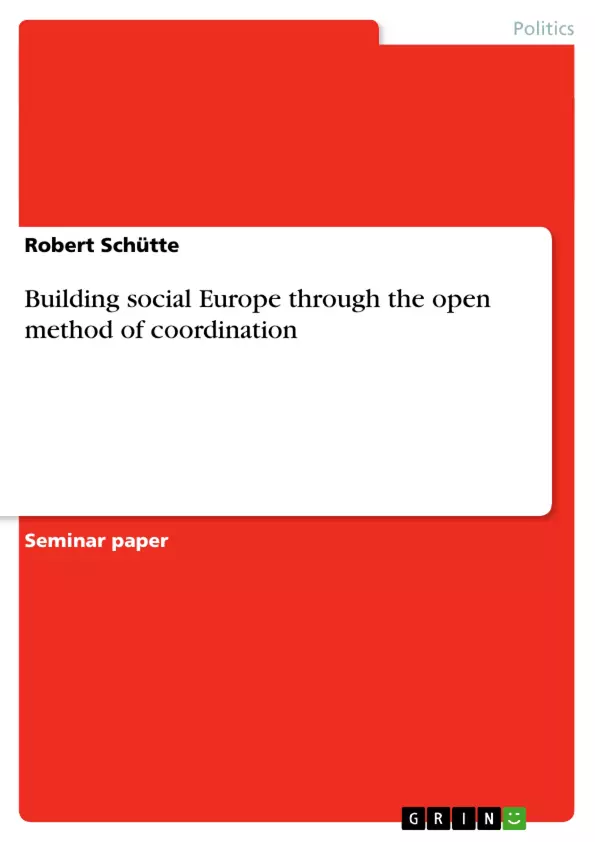Die Arbeit problematisiert die Schwierigkeiten einer gesamteuropäischen Sozialpolitik im Lichte der sog. Offenen Methode der Koordinierung (engl. Open Method of Coordination). Wie funktioniert dieses neue Instrument europäischer Politik, welche konkreten Erfahrungen wurden bisher gesammelt, und hat die Offene Methode der Koordinierung das Potenzial eine gesamteuropäische Sozialpolitik zu ermöglichen? Die vorliegende Arbeit gibt Antworten auf diese Fragen und problematisiert das Thema im Lichte der aktuellen Wohlfahrtsstaatsforschung.
Inhaltsverzeichnis (Table of Contents)
- Introduction
- Welfare-State Diversity under changing Conditions
- Three Idealtypes of Welfare-Regimes in Europe
- The Impact of Europeanisation on National Welfare-State Regimes
- OMC as a Means to develop Social Europe?
- The Open Method of Co-ordination (OMC)
- Concept and History European Employment Strategy (EES)
- Intermediary Results and Prospects of the EES
- Résumé: Building Social Europe through the Open Method of Co-ordination?
- References
Zielsetzung und Themenschwerpunkte (Objectives and Key Themes)
This paper explores the capability of the Open Method of Co-ordination (OMC) to foster a social dimension within the European Union (EU) amid the challenges posed by the European-level induced impediments to the viability of national welfare-statehood.
- The impact of European integration on national welfare-state systems
- The concept and potential of the Open Method of Co-ordination (OMC) in promoting social policy coordination
- The effectiveness of the European Employment Strategy (EES) as a model for OMC implementation
- The role of the European Monetary Union (EMU) and the single market in shaping the social dimension of Europe
- The potential for OMC to contribute to the development of a sustainable and equitable social Europe
Zusammenfassung der Kapitel (Chapter Summaries)
- Introduction: Introduces the paper's objective of assessing whether OMC can contribute to a social dimension in Europe given the constraints on national welfare states. It highlights the relevance of the topic in the context of the European integration process and the increasing need for social policy coordination.
- Welfare-State Diversity under Changing Conditions: This section begins by defining the term “welfare-state” and then applies a theoretical framework to understand the different wealth-redistributing arrangements in Europe. It focuses on the concept of social citizenship as a core principle of the welfare state and its significance in shaping the relationship between market, family, and state.
- Three Idealtypes of Welfare-States in Europe: This section delves into Esping-Andersen's "Three Worlds of Welfare Capitalism" typology, examining the different models of welfare-state regimes found in Europe. It emphasizes the impact of historical, political, and cultural developments on the distinctive features of these models.
- The Impact of Europeanisation on National Welfare-State Regimes: This section explores the challenges posed by European integration on national welfare-state systems. It highlights the external and internal pressures confronting national welfare-state arrangements and the need for enhanced coordination on a European scale.
- OMC as a Means to develop Social Europe?: This section examines the Open Method of Co-ordination (OMC) as a potential tool for promoting social policy coordination in Europe. It analyzes the concept, properties, and expected outcomes of OMC and discusses its application in the field of social policy.
- The Open Method of Co-ordination (OMC): This section provides a comprehensive definition of OMC and its origins. It highlights the importance of collaboration and mutual learning between member states in achieving common objectives. It also emphasizes the role of the European Commission in facilitating this process.
- Concept and History European Employment Strategy (EES): This section delves into the European Employment Strategy (EES) as a prototype of OMC implementation in the social policy domain. It traces the history of the EES and explores its key features, focusing on its potential for promoting employment and social inclusion across Europe.
- Intermediary Results and Prospects of the EES: This section assesses the interim results of the EES and examines its future prospects. It provides insights into the successes and challenges faced by the EES in promoting employment and social inclusion in different member states.
Schlüsselwörter (Keywords)
This paper focuses on the concept of the Open Method of Co-ordination (OMC) as a means of promoting social policy coordination in the European Union (EU). Key themes include the challenges of Europeanization to national welfare-state models, the concept of social citizenship, the "Three Worlds of Welfare Capitalism" typology, the European Employment Strategy (EES), and the relationship between the European Monetary Union (EMU) and the single market in shaping the social dimension of Europe.
Frequently Asked Questions
What is the Open Method of Coordination (OMC)?
It is a non-binding instrument of EU policy aimed at aligning national policies through mutual learning and common objectives rather than legislation.
What are Esping-Andersen's "Three Worlds of Welfare Capitalism"?
A typology that classifies European welfare states into three ideal types: liberal, social-democratic, and conservative/corporatist.
How does European integration affect national welfare states?
The Single Market and Monetary Union create pressures that can limit the ability of national states to maintain traditional redistributive arrangements.
What is the European Employment Strategy (EES)?
The EES is a prototype for the implementation of the OMC, focusing on promoting employment and social inclusion across the EU.
Can the OMC build a "Social Europe"?
The paper assesses whether this soft-law approach has the potential to foster a sustainable social dimension despite the diversity of national systems.
- Quote paper
- Robert Schütte (Author), 2005, Building social Europe through the open method of coordination, Munich, GRIN Verlag, https://www.grin.com/document/45543



